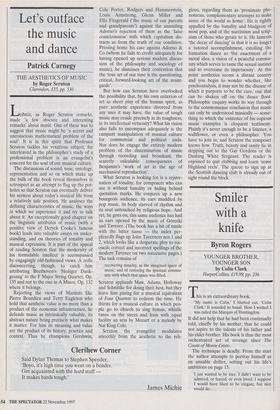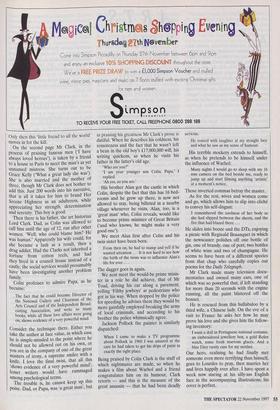Smiler with a knife
Byron Rogers
YOUNGER BROTHER, YOUNGER SON by Colin Clark HarperCollins, £19.99, pp. 236 This is an extraordinary book.
'My name is Colin,' I blurted out. 'Col Clark.' It sounded so banal. How I wished I was called the Marquis of Huntingdon.
It did not help that he had been continually told, chiefly by his mother, that he could not aspire to the talents of his father and his elder brother. His book is thus the most orchestrated act of revenge since The Count of Monte Cristo.
The technique is deadly. From the start the author attempts to portray himself as an amiable drifter, setting out his life's ambitions on page 15: I just wanted to be nice. I didn't want to be admired, or feared, or even loved. I suppose I would have liked to be elegant, but nice would do ... Only then this 'little friend to all the world' moves in for the kill.
On the second page Mr Clark, in the process of praising famous men CI have always loved heroes'), is taken by a friend to a house in Paris to meet the man's as yet unnamed mistress. She turns out to be Grace Kelly (What a great lady she was'). She is also married and the mother of three, though Mr Clark does not bother to add this. Just 200 words into his narrative, that is all it takes for him to brand Her Serene Highness as an adulteress, while appreciating her strength, determination and serenity. This boy is good. Then there is his father, the art historian Lord Clark. Dad, as Colin was allowed to call him until the age of 12, ran after other women. 'Well, who could blame him? He was human.' Apparently his wife could, for she became a lush as a result, then a drug addict. Had the Clarks not inherited a fortune from cotton reels, and had they lived in a council house instead of a castle, the social services would presumably have been investigating another problem family. Colin professes to admire Papa, as he became:
The fact that he could become Director of the National Gallery and Chairman of the Arts Council and of the Independent Broad- casting Association, and write so many books, while all these love affairs were going on, shows evidence of a very powerful mind.
Consider the technique there. Either you take the author at face value, in which case he is simple-minded to the point where he should not be allowed out on his own, or you are in the company of one of the great masters of irony, a supreme smiler with a knife. I love the final twist, that all this `shows evidence of a very powerful mind'; lesser writers would have rummaged among psychological terms. The trouble is, he cannot keep up this poise. Dad, or Papa, was 'a great man', but in praising his greatness Mr Clark's prose is dutiful. When he describes his coldness, his remoteness and the fact that he wasn't left a bean in the old boy's £17,000,000 will, his writing quickens, as when he visits his father in the latter's old age.
`Who are you?'
'I am your younger son Colin, Papa,' I replied.
`Ah yes, so you are.'
His brother Alan got the castle in which Colin, despite the fact that this has 16 bed- rooms and he grew up there, is now not allowed to stay, being billeted in a nearby village whenever he visits. Alan, too, is a `great man' who, Colin reveals, would like to become prime minister of Great Britain (`and who knows, he might make a very good one').
We meet Alan first after Colin and his twin sister have been born.
From then on, he had to stamp and yell if he wanted attention ... It is not hard to see how the birth of the twins was to influence Alan's life for ever ...
The dagger goes in again.
We next meet the would-be prime minis- ter in a role he did achieve, that of Mr Toad, driving his car along a pavement, yelling 'Filthy jewboys' at pedestrians who got in his way. When stopped by the police for speeding he advises them they would be more gainfully employed breaking the arms of local criminals, and according to his brother the police whimsically agree.
Jackson Pollock the painter is similarly dispatched: When I came to make a TV programme about Pollock in 1960 I was amazed at the care he had taken to get his drips of paint in exactly the right place.
Being praised by Colin Clark is the stuff of which nightmares are made, so when he makes a film about Warhol and a friend congratulates him on its humour, Clark retorts — and this is the measure of the great assassin — that he had been deadly
serious.
He roared with laughter at my straight face and what he saw as my sense of humour.
His terrible mockery extends to himself, as when he pretends to be himself under the influence of Warhol:
Many nights I would go to sleep with my 16 mm camera on the bed beside me, ready to jump up and start filming anything 'artistic' at a moment's notice.
Those inverted commas betray the master. As for the rest, wives and women come and go, which allows him to slip into cliché to convey his self-disgust: I remembered the coolness of her body as she had slipped between the sheets, and the fire that had blazed there ...
He slides into booze and the DTs, enjoying a picnic with Reginald Bosanquet in which the newscaster polishes off one bottle of gin, one of brandy, one of port, two bottles of white wine and two of champagne. He seems to have been of a different species from that chap who carefully copies out poems for the Daily Telegraph.
Mr Clark made many television docu- mentaries and owned many cars, one of which was so powerful that, if left standing for more than 20 seconds with the engine running, all the paint blistered off the bonnet.
He is rescued from this hullabaloo by a third wife, a Chinese lady. On the eve of a visit to France he asks her how he may prove his love and she gives him the follow- ing inventory:
I want a doll in Portuguese national costume, an embroidered jewellery box, a gold Rolex watch, some fresh marrons glaces. And a blue Dior vanity case for my mother.
Our hero, realising he had finally met someone even more terrifying than himself, goes to Lourdes to pray, then marries her and lives happily ever after. I have spent a week now staring at his silly-ass English face in the accompanying illustrations; his cover is perfect.



















































































 Previous page
Previous page